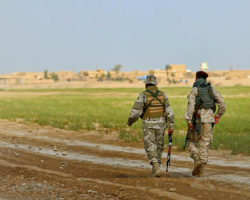Top Class Actions’s website and social media posts use affiliate links. If you make a purchase using such links, we may receive a commission, but it will not result in any additional charges to you. Please review our Affiliate Link Disclosure for more information.

These weapons were used extensively against members of the U.S. armed forces during the Iraq and Afghanistan wars. Roadside IED bomb injuries were the cause of over 60% of deaths in both of these conflicts.
A number of the roadside IED bombs, as well as EFPs and IRAMs, were discovered later by the U.S. Department of Defense to have originated in the country of Iran.
Allegedly behind the country’s supply line to both Iraq and Afghanistan was a vast network of banks willing to fund its covert sponsorship of terrorist activity. Immense profit was the purported motivation for the involved financial institutions’ funneling of money to create the weapons.
Without the banks’ profiteering, Iran was under sanctions from the U.S. Congress that restricted the country’s ability to get needed funds to make such weaponry. Three financial institutions responsible for the money laundering behind prolific roadside IED bombing have pled guilty and settled with the U.S. government—the Hong Kong and Shanghai Banking Corp. (HSBC) of the United Kingdom, Commerzbank of Germany, and Banque Nationale de Paris (BNP) Paribas of France.
Several other financial entities are named defendants in an Iraq and Afghanistan war veterans lawsuit such as Royal Bank of Scotland Group PLC, Credit Suisse Group AG, Barclays Bank PLC, and Standard Chartered Bank of India.
Anti-Terrorism Act
The U.S. passed the Anti-terrorism Act in 1992 which allows for U.S. service people injured by roadside IED bombs, EFPs, and IRAMs to file civil lawsuits against those responsible for acts of international terrorism.
Governmental intelligence discovered Iran’s role in supporting several terrorist organizations early on in the U.S. war involvement. Sanctions established were meant to curtail support of groups such as Shia and Sunni terrorist organizations and Iran’s own Revolutionary Guard Corps and Qods Force.
However, several billion dollars flowed into the country around such sanctions and financed the injuries and deaths of U.S. servicemembers.
The injuries associated with roadside IED bombs are extensive, and they may qualify a veteran of either of these wars to take legal action. Among the injuries are:
- Post-traumatic stress disorder (PTSD)
- Traumatic brain injury (TBI)
- Loss of limb(s)
- Severed Spinal Cord leading to disability
- Loss of vision
- Loss of hearing
- Injuries from flying shrapnel
- Other mental and physical injuries
Spouses of service people injured by roadside IED bombs and the like also could qualify to file a complaint of loss of consortium—the loss of the personal and physical companionship of the injured. By extension, spouses and dependent children of deceased armed forces members could qualify for damages akin to death benefits.
If you or your loved one was injured by a roadside IED bomb in the Iran or Afghanistan war, an experienced attorney can review your case and help decide if litigation is the right path.
If you or a loved one was injured or killed by an IED or EFP while fighting in the Iraq or Afghanistan wars, legal recourse is available. Get help now by filling out the form on this page for a FREE case evaluation.
The attorneys who work with Top Class Actions will contact you if you qualify to let you know if an individual lawsuit or anti-terrorist class action lawsuit is best for you. (In general, anti-terrorist lawsuits are filed individually by each plaintiff and are not class actions.) After you fill out the form, the attorneys who work with Top Class Actions will contact you if you qualify to let you know if an individual lawsuit or class action lawsuit is best for you. Hurry — statutes of limitations may apply.
ATTORNEY ADVERTISING
Top Class Actions is a Proud Member of the American Bar Association
LEGAL INFORMATION IS NOT LEGAL ADVICE
Top Class Actions Legal Statement
©2008 – 2024 Top Class Actions® LLC
Various Trademarks held by their respective owners
This website is not intended for viewing or usage by European Union citizens.
Get Help – It’s Free
Join a Free Iranian IED, EFP Lawsuit Investigation
If you qualify, an attorney will contact you to discuss the details of your potential case at no charge to you.
Please Note: If you want to participate in this investigation, it is imperative that you reply to the law firm if they call or email you. Failing to do so may result in you not getting signed up as a client, if you potentially qualify, or getting you dropped as a client.
Email any problems with this form to questions@topclassactions.com.
Oops! We could not locate your form.












